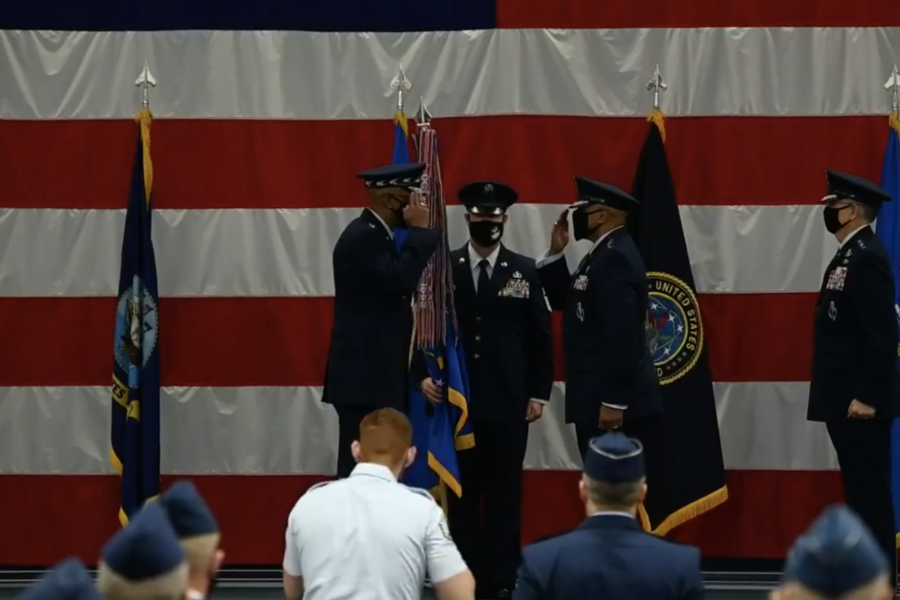Gen. Anthony J. Cotton received his fourth star and took charge of Air Force Global Strike Command on Aug. 27, pledging to shepherd the two Air Force legs of the nuclear triad through a “major transition,” a reference both to much-needed modernization and increasing strategic competition.
Cotton, a career missile and space officer, cited rising threats from Russia and China, pointedly noting reports that China has added numerous intercontinental ballistic missile silos and that Russian President Vladimir Putin claims to have modernized 80 percent of his nation’s nuclear arsenal.
But Cotton also noted the challenges facing the Air Force’s nuclear enterprise, citing modernization like the Ground-Based Strategic Deterrent and the Long Range Standoff weapon system, which will each take about a decade to mature. “We need to masterfully execute the modernization of the nuclear portfolio,” Cotton said. “We need to have agile technology infused in our systems, ready to adapt to future challenges. We also need to sustain our current force and keep it capable and ready until replacements arrive.”
AFGSC must heed the call of call to “accelerate change or lose” voiced by Chief of Staff Gen. Charles Q. Brown Jr.
Cotton takes command of AFGSC after nearly two years as its deputy, serving under Gen. Timothy M. Ray, who retired in July and officially handed over the reins Aug. 27.
“Tony, I couldn’t have asked for a better teammate,” Ray said. “We never had to be boss and deputy, we were just two senior leaders trying to sort it all out. I couldn’t have asked for a better interlocutor, a better teammate to talk at the strategic level. … In our conversations, it was an instant connection.”
China and Russia, who Ray called “Dragon” and “Bear,” pose an existential threat that Global Strike will have to contend with for years to come, Ray said. “We’re entering an unprecedented time … that will pose probably one of the toughest strategic challenges to who we are.”
Brown, who presided over the promotion ceremony that immediately preceded the change of command, praised the leadership of both Ray and Cotton, saying they had instilled an innovative, responsive culture at Global Strike Command.
“There are a few things that the Air Force can never get wrong. Ensuring the safety, the security and the reliability of two-thirds of our nation’s nuclear triad is binary. We must never fail,” Brown said. “That is why Gen. Cotton is a perfect choice to inspire and lead this command into the future. Throughout Tony’s career, he has demonstrated great vision, courage, and leadership.”
In addition to serving as deputy commander, Cotton previously commanded the 20th Air Force, the 45th Space Wing, and the 341st Missile Wing. He also served as commander and president of Air University from 2018 to 2019.
That stint in charge of the 20th Air Force, Cotton said Aug. 27, was particularly meaningful to him, because it is the same numbered air force that his father served in throughout his own Air Force career.
“He was my biggest hero, and I’m blessed to follow in the footsteps of that Chief, my dad, Chief Master Sergeant James Cotton,” he said.
Cotton is the first Black commander of Air Force Global Strike Command, and one of only a handful of Black four-star generals in Air Force history. He acknowledged that Aug. 27, saying he was “humbled to stand on the shoulders of icons” like Gen. Benjamin O. Davis Jr., the first Black brigadier general in the service, Gen. Daniel “Chappie” James Jr., the first Black four-star, Gen. Lloyd W. “Fig” Newton, Gen. Lester L. Lyles, Gen. Larry O. Spencer, Gen. Darren W. McDew and Brown, the first Black Chief of Staff. Cotton said each of them, as well as former Chiefs of Staff Gens. Larry D. Welch and Curtis E. LeMay, were all inspirational in his career.


